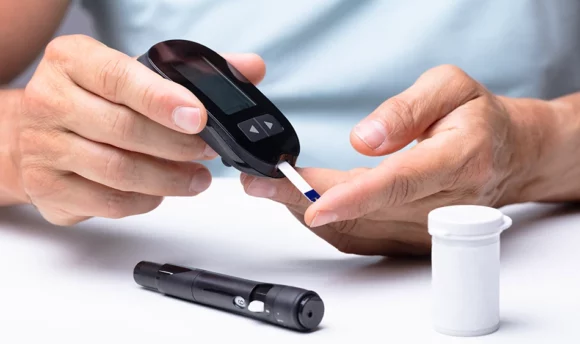Is Keto Diarrhea Real? Everything You Need to Know
In recent years, the pound-shedding, low-carb, high-fat diet exploded into the health world in more ways than one. What will going keto do to your digestive system?

With obesity rates at an all-time high, it’s no wonder some Americans are trying the keto diet to lose weight.
While the fat-burning ketogenic diet has had life-changing results for some, others report severe diarrhea. For some people, the body struggles to process a high fat intake and flushes it out – resulting in the runs.
Are you considering a high-fat diet? Or are you already suffering from keto diarrhea? Read on to learn how to prevent diarrhea while losing body weight with the keto diet.
Keto Diarrhea – What Is It?
Keto diarrhea is an unfortunate side effect of eating too much fat. The ketogenic diet emphasizes high-fat consumption with very few carbohydrates. When the body switches to a high-fat diet, it may suffer from a lack of fiber or too many artificial sweeteners. Most people should adjust within a few weeks of going keto.
Following the keto diet means eating a lot of fat with few carbs and moderate protein. Most diets recommend less than 20–50g of carbohydrates per day. Ideally, your eating plan should include:
- 5% carb intake
- 20–30% protein intake
- 65–80% fat intake
In a typical 2,000-calorie diet, you might have 40g of carbs, 75g of protein, and 165g of fat. Remember that a banana could contain around 27g of carbs – the keto diet is very limiting.
Most people find that reducing their carbs means eating a lot less fruit. Less fruit equals less fiber intake, resulting in a disrupted digestive system. Typically, the lack of fiber causes constipation. However, many keto dieters find they suffer from the opposite: keto diarrhea.
Following the highly restrictive keto diet is challenging enough without the added stress of running to the toilet all day. Worse still, increasing your dietary fat intake might also lead to cramps and bloating. If you don’t seek help for your keto diarrhea, you may get seriously dehydrated.
With a few tweaks to your diet, keto diarrhea should pass quickly for most.
Can Ketosis Cause Diarrhea?
Unfortunately, the fat-burning popular diet might upset your digestive tract and cause keto diarrhea. When you change your dietary habits, your gastrointestinal system (GI) might take a hit. If you cut out particular food groups – such as carbs – you’ll get an imbalance in your gut bacteria.
Gut microbiomes feed off short-chain fatty acids from grains, fruits, and vegetables. However, when following the keto diet, you’ll eat a minimal amount of these foods. Some people experience nausea and fatigue – known as the keto flu – for a few weeks as their gut microbiome adjusts.
However, others continue to suffer tummy trouble throughout the keto diet.
Dietary fats are harder for digestive enzymes to break down than other foods. Some people’s digestive tracts cannot adjust to metabolizing a high-fat diet. Unable to use the healthy fats they consume, their bodies attempt to get rid of them – through keto diarrhea.
Why Do I Have Diarrhea on Keto?
If you’re one of the unfortunates who cannot sustain a higher fat intake, your body cannot keep up with the breakdown and absorption of fats. Therefore, when the unabsorbed fats get into the small intestine and colon, they will pull more water to help its passage; the result: keto diarrhea.
Ensure you eat healthy fats, like those found in olive oil, safflower and sunflower, coconut oil, lard, butter, cream, and high-fat cheese. Too many omega-6 and omega-3 essential fats can cause diarrhea. Similarly, you may experience keto diarrhea with too many dairy fat products.
Keto diarrhea isn’t permanent for everyone. There are several reasons your high-fat diet might cause diarrhea. Artificial sweeteners and sugar alcohols might also cause diarrhea. People following the keto diet will eat higher amounts of sugar alcohols and artificial sweeteners.
Fortunately, cutting down on sugar alcohols and artificial sweeteners will reverse the undesirable side effects of the keto diet.
How Long Does Keto Diarrhea Last?
For most people, your GI tract should adjust to the ketogenic diet, and the tummy troubles should decrease within a month. Adding too much fat takes its toll on your gut bacteria. When making any dietary changes, give your digestive tract a chance to restore its gut health before giving up on the keto diet.
If your gut microbiome cannot adjust to the high-fat keto diet, you might have to accept that you’ll have to achieve weight loss another way.
Continuous digestive upset may affect your long-term health. While starting a keto diet can cause gastrointestinal disturbances, there’s a possibility something else is to blame.
Seek professional medical advice if you’re concerned about your GI symptoms. Chronic diarrhea can cause an electrolyte imbalance and result in severe dehydration.
How to Stop Keto Diarrhea? 4 Ways to Help Yourself
Don’t give up on the keto diet before you see results. If you’re struggling with diarrhea, make sure you stay hydrated and replenish your body with electrolytes.
If you don’t think you need to see a doctor yet, here are some ways to help you overcome the keto flu and stick to your low-carb diet.
#1 Ease into the keto diet
Following an elimination diet will disrupt your digestive health. Your gut needs a chance to adjust to the low-carb keto diet. Therefore, it’s a good idea to ease into the ketogenic diet. Try cutting back your carb intake bit by bit each week to avoid keto diarrhea.
Similarly, avoid eating too many sugar alcohols and artificial sweeteners. As you decrease carbohydrates, up your intake of healthy fats like those found in avocados and olive oil.
If you know you have a sensitive digestive system, ensure you follow keto recipes that won’t exacerbate GI upset. For instance, avoid caffeine and eat fermented foods.
#2 Up your fiber intake
Consuming more fiber is one of the best ways to reduce keto diarrhea or constipation. The keto diet cuts out most fruits and vegetables as they have a high amount of carbohydrates. Fruit and vegetables are high-fiber foods needed to maintain a healthy gut.
When switching to the keto diet, maintain your soluble fiber intake. However, you should consider how you add fiber to your diet.
It might seem obvious to take a fiber supplement to ease your gut. However, supplements often contain too many grams of carbohydrates. This can disrupt your ketogenic diet and prevent your body from reaching ketosis – the desirable fat-burning stage.
Instead, eat high-fiber foods that stick to the low-carb diet, such as nuts, seeds, leafy greens, and cruciferous veggies.
#3 Stay hydrated
Frequent trips to the toilet often lead to dehydration. When you get keto diarrhea, your intestines and colon pull lots of water out of your body to help expel the fatty foods it wants to get rid of.
The problem? When you lose all your water, your body becomes dehydrated. If you experience keto diarrhea – whether it’s a temporary reaction to changing your diet or not – you must stay hydrated.
Drink plenty of water and electrolytes to ease the symptoms of keto diarrhea.
Water, fruits, and soups are excellent ways to replenish fluids. If you’re determined to stick to the keto diet, try to limit your fruits. However, there are plenty of keto-friendly foods that will rehydrate your body, such as low-carb vegetables like broccoli and cauliflower.
#4 Try another weight loss diet
The keto diet isn’t for everyone. Unfortunately, some people’s bodies are not cut out for the high-fat diet. If you try going keto and suffer from unfortunate side effects, perhaps it is time to try another weight loss diet.
Consider whether intermittent fasting is better than keto. Subtle adjustments to your eating habits could make all the difference without sacrificing the fat-burning goal.
Alternatively, you could try other popular diets:
- The Atkins diet – also focuses on controlling blood sugar levels.
- The Zone diet – emphasizes high-quality carbohydrates and balanced meals.
- Vegan diet – removing all animal products is more of a lifestyle than a diet.
- Mediterranean diet – a less strict diet including a range of healthy fats.
- Weight Watchers – focuses on exercise, diet, and support.
Consult healthcare professionals to find a diet that works for you.
FAQs
The keto diet involves making significant changes in your eating habits. Constipation and keto diarrhea are common side effects as your gut bacteria adjust to a sudden change in nutrients. To avoid keto diarrhea in the first month of your diet, ease into your new eating plan.
Keto pills are dietary supplements that aid the fat-burning effects of switching to a keto diet. As they emphasize the impact of changing your eating habits, you may find your side effects worsen. Check the instructions and consult a medical professional before taking keto pills.
Many people suffer from keto diarrhea in the first few weeks of switching to the keto diet. When you drastically change your eating habits, your body will take a while to adjust. You may experience keto flu symptoms such as diarrhea, nausea, headaches, fatigue, irritability, and constipation.
A Word From Our MD
The keto diet involves drastic changes to the consumption of food groups. When you cut out the majority of your carbohydrates, you will stop eating as many fruits and vegetables.
Without this essential source of fiber, you may suffer from diarrhea or constipation, among other keto flu symptoms. Additionally, fat is hard for the digestive system to break down. Keto diarrhea is prevalent within the first month of dieting.
To avoid or relieve this unpleasant side effect of burning fat, increase your fiber intake with keto-friendly foods, such as leafy greens and nuts. If diarrhea persists, consult a medical professional. It may be that your body cannot adjust to a high-fat diet.
Conclusion
Keto diarrhea might make you tempted to break your diet. Indeed, if unpleasant symptoms persist, try making changes to your eating habits. However, keto diarrhea will pass within a month for most people.
Once you’ve persisted past the keto flu stage of dieting, you’ll see excellent results from your hard work and fat-burning diet.
Remember to stay hydrated and eat more fiber to relieve keto diarrhea and maintain a healthy gut. If your body cannot adjust to the keto diet, there is a whole world of other healthy eating plans.

















































 Select your language:
Select your language: 








